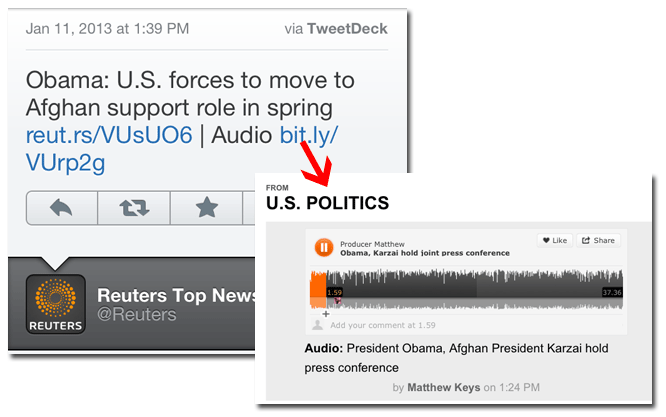Category Archives: Journalism
Providence (short film about Bradley Manning leaks)
The military (and many outside the military) consider Bradley Manning a traitor for leaking classified documents. Let’s imagine we’re in the latter days of World War II and a German soldier leaks thousands of documents related to concentration camps and the atrocities committed there. Is he a traitor? Probably. Did he do the right thing? Depends on who you ask? If the only difference between my hypothetical and the Manning case is whose ox was gored, that’s morally thin ice.
But the Manning leaks could have endangered American lives, goes one argument. No doubt, although I’ve not seen anything to suggest any lives have actaully been lost. Would it matter if some of the leaked documents revealed American actions were costing innocent lives?
I thought the Viet Nam war was a bad idea, primarilly because it could have gotten me killed. Turns out there were plenty of other reasons. Like the the mass murder of between 347 and 504 unarmed civilians near the village of My Lai on March 16, 1968, by United States Army soldiers. Most of the victims were women, children, infants, and elderly people. Some of the women were gang-raped and their bodies were later found to be mutilated and many women were allegedly raped prior to the killings.
Would it be treason to tell the world about My Lai?
“My country, right or wrong!” was a popular slogan for those supporting that war. That did work for me then and it doesn’t work for me now.
Challenges of Conversational Journalism
“The most visible journalism these days — aka the loudest journalism, namely cable news, pop culture blogs, tabloid magazines, TMZ, Buzzfeed, HuffPo, talk radio, etc. — mostly takes the form of opinionated conversation: professional media people discussing current events much like you and your friends might at a crowded lunch table. A side effect of this way of doing journalism is that you rarely hear from anyone who actually is an expert on the subject of interest at any particular time. That approach doesn’t scale; finding and talking to experts is time consuming and experts without axes to grind are boring anyway. So what you get instead are people who are experts at talking about things about which they are inexpert.”
Twitter Radio
Twitter is my first source for breaking news. If anything big (that I care about) happens, it will show up first in my Twitter feed. I guess a cable news channel might come close or a good all-news radio station (do those still exist?) but my Twitter stream is non-stop in my pocket. Smart news organization (NPR and Reuters, for example) know they need to have their stories where I am, rather than try to get me to come to where they are.

Is the future of serious journalism in the hands of corporate media?
ZDNet’s Tom Foremski asks: “As the business models for serious journalism continue to erode where will we get the quality media we need as a society to make important decisions about our future?”
And warns: “Special interest groups will gladly pay for the media they want you to read, but you won’t pay for the media you need to read.”
Cisco has a large team of journalists producing articles about the tech industry for its online magazine “the network.” John Earnhardt said that the reporters have just two rules to follow: “Don’t write about competitors, and don’t write anything that could harm Cisco.”
At Nissan Motors, the company has built a full scale TV studio and produces a news program with veteran journalists from the BBC and elsewhere.
“Why does Nissan want to get into the business of serious news journalism? Why not sponsor an existing news show? His answer was surprising. “I don’t have the confidence that traditional news organizations will be able to survive the transition to the new business models. Why should I invest large amounts of money over the next few years in a failing enterprise?”
If there’s a take-away from this piece it’s probably this: “Media is a loss leader, you need something else to sell. If all you have is media to sell, then you will have losses.”
What does mobile explosion mean for news?
Some nuggets from new Pew Research Center report based on a survey of 9,513 U.S. adults conducted from June-August 2012 (including 4,638 mobile device owners)
- Half of all U.S. adults now have a mobile connection to the web through either a smartphone or tablet
- Nearly a quarter of U.S. adults, 22%, now own a tablet device-double the number from a year earlier
- 64% of tablet owners and 62% of smartphone owners say they use the devices for news at least weekly
- As many as 43% say the news they get on their tablets is adding to their overall news consumption. And almost a third, 31%, said they get news from new sources on their tablet
- Fully 60% of tablet news users mainly use the browser to get news on their tablet, just 23% get news mostly through apps and 16% use both equally
The Business of War (VICE News)
In the last couple of days I’ve watched three or four news documentaries produced by Vice. The one below is titled “The Business of War: SOFEX”
If you invest the 20 minutes to watch this you might conclude — as I did — the world is fucked. Not a little bit fucked. Not “It’s okay, I think we can un-fuck this.” We are Ving-Rhames-Pulp-Fiction fucked.
This documentary explains SO much of what is happening in the world. As you watch it, try to imagine Anderson Cooper or Brian Williams (and the corporations they work for) doing this kind of reporting.
As I watched these reports, I kept contrasting them to the network news formats of the past 20+ years. Half-hour summaries with forest fires and floods at the top, followed by fluffy pretend news at the bottom. With lots and lots of commercials mixed in.
In all fairness, you can sort of imagine a piece like the one below on 60 Minutes but only after the teeth have been extracted.
I spotted the link to this documentary in my Twitter stream. I can play these on my iPhone, any time, anywhere. Or, using AirPlay to stream them to my big screen, watch them at home via Apple TV.
I can only assume the gasping, lumbering news organzations of yore know they are irrelevant but just don’t know what to do about it.
There is nothing on CNN or Fox or XYZ for which I’d pay cash money. But yeah, I’d pay for reporting this good.
The MP3 of journalism
“But we are in the midst of a transformative shift in the craft of journalism. Text-only stories, the kind your parents found in their morning newspapers and characterized by the classic inverted pyramid (most important stuff at the top, least important stuff at the bottom) could eventually go the way of 45-rpm records. The MP3 of journalism may be the “live blog,” which relies on the merging of platforms and weaving of text with video, audio, external links to other articles (including those of rival news organizations), blogs, tweets, Facebook posts, and whatever other useful information is available. It doesn’t matter if information originates from a New York Times article, a tweet from an eyewitness on the scene, or someone offering astute commentary and curating links, a video shot by a protester or produced by a team at CNN. Because in the live blog format disparate platforms become irrelevant, and the walls between these separate silos of content simply dissolve.”
When experts don’t seem so “expert”
This is an excerpt from a post by Terry Heaton, one of the handful of thinkers I look to first for an understanding of what’s happening in the world. The link to his post is below, but the following paragraphs can stand on their own.
Our culture is based upon hierarchical layers of “expertise,” some of it licensed by the state. This produces order, which Henry Adams called “the dream of man.”
It also produces elites, the governing class, those who call the shots for others not so fortunate as to occupy the higher altitudes. This is the 1% against which the occupiers bring their protests, their dis-order.
We used to think that elites and hierarchical order were necessary for the well-being of all, but that idea is being challenged as knowledge — the protected source of power (and elevation) — is being spread sideways along the Great Horizontal. It’s not that we’re so much smarter than we used to be; it’s that the experts don’t seem so “expert” anymore, because the knowledge that gave them their status isn’t protected today. Anybody can access it with the touch of a finger.
This is giving institutions fits, and each one is fighting for its very life against the inevitable flattening that’s taking place. Medicine wants no part of smart and informed patients and neither does the insurance industry. The legal world scoffs at the notion that they’re in it for themselves as they occupy legislatures and create the laws that work on their behalf. Higher education increasingly touts the campus experience over what’s being learned, because they all know that the Web has unlimited teaching capacity. Government needs its silos to sustain its bureaucracy, but the Great Horizontal cuts across them all.
I added the emphasis in graf 3. For me, this is The Big Idea of the early 21st century. The high-speed smart phone in my pocket means you don’t necessarily know more than I do, so why the fuck should you be in charge?
What an exciting time to be alive. And sure to get exciting-er.
We need more chaos in the news business
Clay Shirky argues we need for the news business to be more chaotic than it is because ” there are many more ways of getting and reporting the news that we haven’t tried than that we have.” Here are some excerpts from his latest essay:
Buy a newspaper. Cut it up. Throw away the ads. Sort the remaining stories into piles. Now, describe the editorial logic holding those piles together.
—
For all that selling such a bundle was a business, though, people have never actually paid for news. We have, at most, helped pay for the things that paid for the news.
—
But even in their worst days, newspapers supported the minority of journalists reporting actual news, for the minority of citizens who cared.
—
I could tell (my) students that when I was growing up, the only news I read was thrown into our front yard by a boy on a bicycle. They might find this interesting, but only in the way I found it interesting that my father had grown up without indoor plumbing.
—
News has to be subsidized because society’s truth-tellers can’t be supported by what their work would fetch on the open market. Real news—reporting done for citizens instead of consumers—is a public good.
—
A 30% reduction in newsroom staff, with more to come, means this is the crisis, right now. Any way of creating news that gets cost below income, however odd, is a good way, and any way that doesn’t, however hallowed, is bad.

